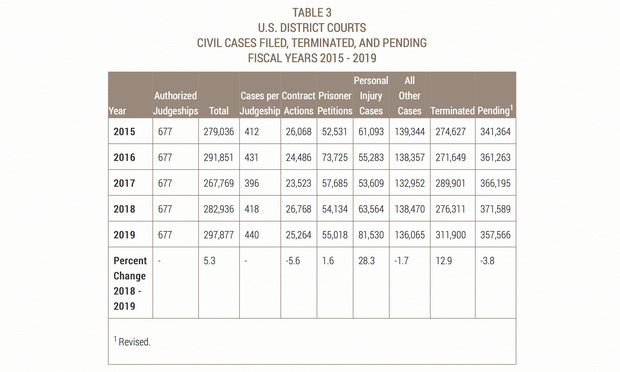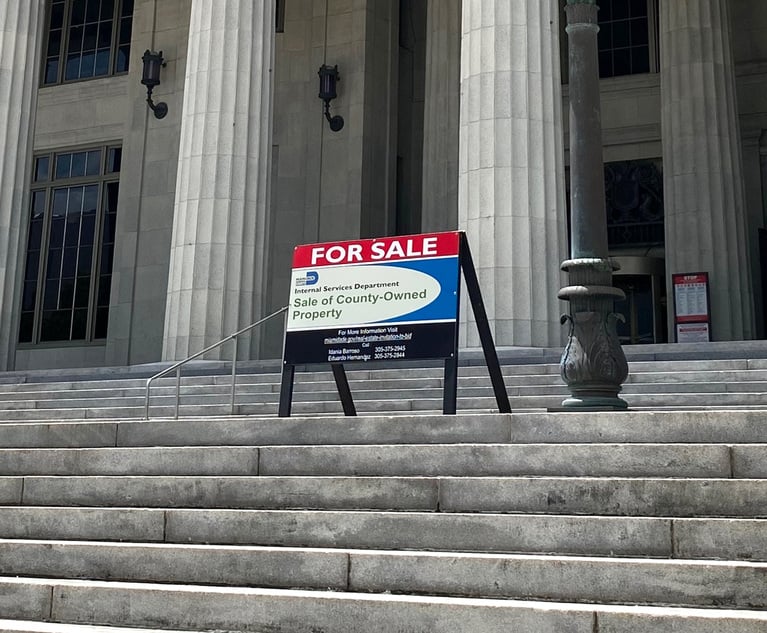Small Law Firms Fight Back as More Personal Injury Cases Move to Federal Court
Government data showed that personal injury cases filed in federal court had dramatically increased by nearly 30% in the last full calendar year.
July 09, 2020 at 03:43 PM
4 minute read
 Charles Baumberger, Rossman, Baumberger, Reboso & Spier.
Charles Baumberger, Rossman, Baumberger, Reboso & Spier.
Before the devastation brought by the coronavirus that shutdown trials throughout the country, government data showed that personal injury cases filed in federal court had dramatically increased by nearly 30% in the last full calendar year.
That's bad news for small plaintiff firms, who often lack the resources to do battle in federal court. But that might soon change as firms adapt.
According to the latest available Judicial Business report published by the Administrative Office of the U.S. Courts, nationwide throughout all U.S. district courts, 81,530 cases were filed in 2019, which is almost 18,000 more cases than the previous year, and nearly 28,000 more cases than 2017.
Charles Baumberger, a partner at Rossman, Baumberger, Reboso & Spier in Miami, points to one reason his recent maritime law case landed outside of state court.
A client who sustained injuries after falling aboard a cruise ship sailing in Alaska had a forum-selection clause mandating that any lawsuit be filed in federal court in the Southern District of Florida.
"If you're dealing with admiralty cases down here in the Southern District of Florida, passengers have what they call a contracted passage that they have to sign," Baumberger said. "In that contract, you have a one-year statute of limitations in which you have to file suit in federal courts."
Baumberger also identified the sharp differences in the workload from state courts to federal courts. Plus, the motions in federal court are more detailed, as they must include a memorandum of law, which can create a burden on smaller firms.
Miami attorney Philip D. Parrish said small plaintiffs firms often do not have the time or the resources to devote to a case pending in federal court, for instance, while they are out taking depositions and engaging in other discovery. Parrish also observed that summary judgment is often easier to obtain in federal court than it is in state court.
"Chains such as Walmart and Target, and insurance companies are moving cases to federal court because the defendants want to try and take advantage of what they consider to be a more friendly summary judgment standard in federal court," Parrish said. "They also believe that not many plaintiffs and personal injury attorneys are as comfortable litigating in federal court."
 Data on civil filings in the U.S. district courts.
Data on civil filings in the U.S. district courts.Parrish is an example of a plaintiffs attorney who has been able to capitalize on this trend by defense counsel choosing to litigate personal injury cases in federal court. Parrish partners with plaintiffs attorneys during the trial portion of their federal court cases to provide research and writing assistance to beleaguered personal injury lawyers who are used to litigating in state court.
The remaining question is whether this trend of personal injury cases filed in federal court will continue its upward trajectory.
Richard P. Cole, a partner at Cole Scott & Kissane in Miami that handles personal injury defense matters, implied that this trend may come to a halt in 2020 because of the coronavirus and the corresponding delay in federal court proceedings resulting from the pandemic.
But it is likely the trend will resume after the year 2020. According to Baumberger, the economics of trying a personal injury case in federal court has made it more lucrative for defense lawyers, given the pleading requirements in that venue.
"I know defense lawyers like it," Baumberger said. "They bill by the hour."
This content has been archived. It is available through our partners, LexisNexis® and Bloomberg Law.
To view this content, please continue to their sites.
Not a Lexis Subscriber?
Subscribe Now
Not a Bloomberg Law Subscriber?
Subscribe Now
NOT FOR REPRINT
© 2025 ALM Global, LLC, All Rights Reserved. Request academic re-use from www.copyright.com. All other uses, submit a request to [email protected]. For more information visit Asset & Logo Licensing.
You Might Like
View All
US Judge Dismisses Lawsuit Brought Under NYC Gender Violence Law, Ruling Claims Barred Under State Measure

Attorney Emerges as Possible Owner of Historic Miami Courthouse Amid Delays of New Building

Second DCA Greenlights USF Class Certification on COVID-19 College Tuition Refunds
3 minute read
Florida Law Firm Sued for $35 Million Over Alleged Role in Acquisition Deal Collapse
3 minute readLaw Firms Mentioned
Trending Stories
- 1Starbucks Hands New CLO Hefty Raise, Says He Fosters 'Environment of Courage and Joy'
- 2Blockchain’s Fourth and Fifth Amendment Privacy Paradoxes
- 3Prior Written Notice: Calabrese v. City of Albany
- 4Learning From Experience: The Best and Worst of Years Past
- 5Treasury GC Returns to Davis Polk to Co-Chair White-Collar Defense and Investigations Practice
Who Got The Work
J. Brugh Lower of Gibbons has entered an appearance for industrial equipment supplier Devco Corporation in a pending trademark infringement lawsuit. The suit, accusing the defendant of selling knock-off Graco products, was filed Dec. 18 in New Jersey District Court by Rivkin Radler on behalf of Graco Inc. and Graco Minnesota. The case, assigned to U.S. District Judge Zahid N. Quraishi, is 3:24-cv-11294, Graco Inc. et al v. Devco Corporation.
Who Got The Work
Rebecca Maller-Stein and Kent A. Yalowitz of Arnold & Porter Kaye Scholer have entered their appearances for Hanaco Venture Capital and its executives, Lior Prosor and David Frankel, in a pending securities lawsuit. The action, filed on Dec. 24 in New York Southern District Court by Zell, Aron & Co. on behalf of Goldeneye Advisors, accuses the defendants of negligently and fraudulently managing the plaintiff's $1 million investment. The case, assigned to U.S. District Judge Vernon S. Broderick, is 1:24-cv-09918, Goldeneye Advisors, LLC v. Hanaco Venture Capital, Ltd. et al.
Who Got The Work
Attorneys from A&O Shearman has stepped in as defense counsel for Toronto-Dominion Bank and other defendants in a pending securities class action. The suit, filed Dec. 11 in New York Southern District Court by Bleichmar Fonti & Auld, accuses the defendants of concealing the bank's 'pervasive' deficiencies in regards to its compliance with the Bank Secrecy Act and the quality of its anti-money laundering controls. The case, assigned to U.S. District Judge Arun Subramanian, is 1:24-cv-09445, Gonzalez v. The Toronto-Dominion Bank et al.
Who Got The Work
Crown Castle International, a Pennsylvania company providing shared communications infrastructure, has turned to Luke D. Wolf of Gordon Rees Scully Mansukhani to fend off a pending breach-of-contract lawsuit. The court action, filed Nov. 25 in Michigan Eastern District Court by Hooper Hathaway PC on behalf of The Town Residences LLC, accuses Crown Castle of failing to transfer approximately $30,000 in utility payments from T-Mobile in breach of a roof-top lease and assignment agreement. The case, assigned to U.S. District Judge Susan K. Declercq, is 2:24-cv-13131, The Town Residences LLC v. T-Mobile US, Inc. et al.
Who Got The Work
Wilfred P. Coronato and Daniel M. Schwartz of McCarter & English have stepped in as defense counsel to Electrolux Home Products Inc. in a pending product liability lawsuit. The court action, filed Nov. 26 in New York Eastern District Court by Poulos Lopiccolo PC and Nagel Rice LLP on behalf of David Stern, alleges that the defendant's refrigerators’ drawers and shelving repeatedly break and fall apart within months after purchase. The case, assigned to U.S. District Judge Joan M. Azrack, is 2:24-cv-08204, Stern v. Electrolux Home Products, Inc.
Featured Firms
Law Offices of Gary Martin Hays & Associates, P.C.
(470) 294-1674
Law Offices of Mark E. Salomone
(857) 444-6468
Smith & Hassler
(713) 739-1250






